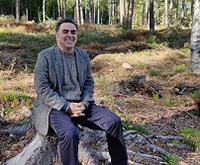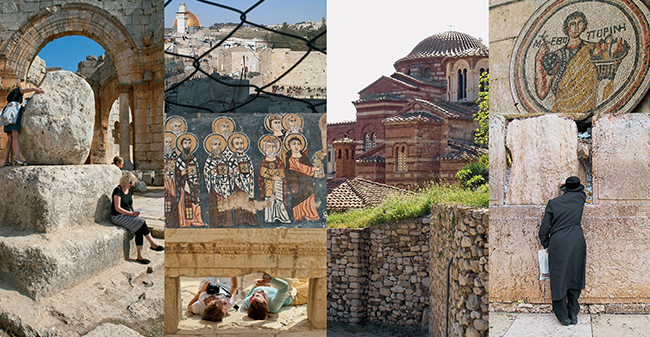What is RRE?
The RRE programme gives you knowledge about the religious traditions at the root of European culture and a deep understanding of the formative processes of Judaism, Christianity and Islam. Four Scandinavian Universities, Oslo, Copenhagen, Lund and Aarhus offer the RRE MA jointly, and its students come from all over the world. The programme combines distance online learning with compact in-person seminars at the four host institutions and excursions to European capitals such as Athens and Rome.

You can read more about the courses, student life, admission and how to apply at the RRE website and at UiO’s website on RRE.

The RRE Experience
We talked to three RRE students at the Faculty of Theology at the University of Oslo. Violina Yankova-Ingvarsson received her MA degree this summer, Ebrahim Adibanmehr will graduate in a few months and Peter Hvalsengen Smaadahl was accepted into the RRE programme this year and is halfway through his first term. We asked Violina, Ebrahim and Peter to tell us about their RRE experience and why they chose this particular MA programme.
Understanding Religion
Peter stressed that he was drawn to the RRE programme, because he wanted to study religion and philosophy: “I am enthusiastic about studying belief systems and religions, and I wanted to combine it with my knowledge of several languages. With RRE, I am able to explore these areas combined with a philosophical aspect and to expand my knowledge.”

It was a strong interest in a comparative study of Judaism, Christianity and Islam that made Ebrahim choose RRE: “I teach history of religions in my home country, Iran, as well as English and religious texts. I have learnt a lot about Judaism, Christianity and Islam, but also about the history of Europe and the history of the Middle East.”
When Violina was looking for a master programme a few years ago she wanted a study that could strengthen her understanding of European culture both historically and today:
“And indeed, what better way to do so than to start ‘at the roots’ of religious ideas, practices and narratives and work yourself up to contemporary phenomena that may share the same ‘roots’?
The RRE program provides the necessary academic ‘toolbox’ for one to acquire that ‘multi-layered’ perspective which might prove invaluable in various areas of research but also in the every-day life in our increasingly complex, multifaceted, even fractured contemporary societies.”
A Student Favourite: The Study of Ancient Religions
We also asked our three RRE students about their favourite course in the programme, and here the first-year course on the study of ancient religion came with a special recommendation from all three. Peter said: “This is my first semester and it has been very enjoyable so far. We are currently talking about the different beliefs of the Greco-Roman world. I am equally excited about all my courses, but I have thoroughly appreciated the study of ancient religions course and I am looking forward to writing a paper soon.” Ebrahim agreed with Peter: “Of course all RRE courses are interesting, my favourite, however, was the study of ancient religions – but I also really enjoyed the course on sacred texts.”

Violina also has a soft spot for “Ancient Religions”, as the course is usually abbreviated: “It is not easy to say which of the courses of the RRE programme was my favourite, but I would like to point to the study of ancient religions. It was such an enriching exploration of the topic and we had such inspiring discussions. I would like to mention the course “Space, Art and Identity in Synagogue, Church and Mosque” as well though. It was very interesting!”
You can read more about the different RRE courses at the RRE website.
The Journey to the Roots and Back
Towards the end of our conversation, we asked Violina, Ebrahim and Peter if they had any advice for students, who were considering applying to the RRE programme at UiO. Violina offered this piece of advice: “Enjoy it! The journey ‘to the roots and back’ is one of the best one can wish for!”
Ebrahim and Peter agreed and said that they would definitely recommend the programme to others. Peter elaborated: “The RRE programme is enriching and students of this programme will have a deeper understanding of humanity and history in many ways. This is because while the program is about religion, there is still endless approaches and theories looking at everything from socio-political, psychological, historical and linguistic causes and effects, as well as many more areas with regard to the development of religions in different times and spaces.”
Just before we said goodbye Violina made one final remark about future RRE students: “I feel glad on their behalf, but also a little bit jealous really when I think of the exciting journey that lies ahead of them.”
 Who can apply to RRE?
Who can apply to RRE?
Everyone with a Bachelor’s degree in a field of study that is relevant to the RRE programme (e.g., theology, religious studies, classical philology, Semitic languages, ancient history, classical archeology) can apply.
